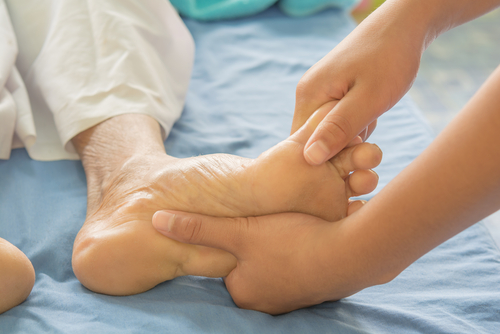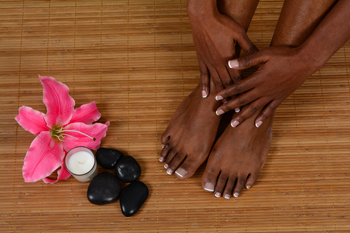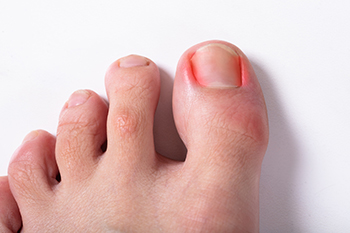July 2023
The Benefits of a Foot Massage

Foot massages offer numerous benefits beyond simply feeling good. They can also promote overall health, enhance a sense of well-being, and induce deep relaxation. Chinese medicine reveals that the sensory nerves connected to internal organs are predominantly located in the feet. Consequently, a skilled reflexology or massage practitioner can utilize the foot as a precise map to address various health conditions through targeted massage techniques and pressure point work. Regular foot massages not only offer therapeutic effects but also contribute to the stimulation of muscles, improvement of circulation, reduction of stiffness, and alleviation of foot pain. By applying appropriate pressure and manipulating specific areas of the foot, a massage can enhance blood flow to the feet and lower extremities, delivering vital nutrients and oxygen to the tissues. This increased circulation helps to nourish the muscles, reduce inflammation, and support the body's natural healing processes. If you're intrigued by the potential advantages of foot therapy and wish to delve deeper into its healing properties, it is highly suggested that you schedule an appointment with a podiatrist who can offer specialized guidance, tailor treatment plans to your individual needs, and provide comprehensive information on the subject.
Foot therapy is often necessary for those recovering from either foot deformities or foot injuries. If you have concerns regarding therapy, consult with Genine Befumo, DPM from University Foot and Ankle Center, L.L.C. Our doctor can provide the care you need to keep you pain-free and on your feet.
Most Common Injuries
People who are active or athletes are prone to a variety of injuries. Therefore, it is often important to take part in physical therapy in order to quickly get back on the right track.
What to Do When Injured
Physical Therapy – This specialized treatment will focus on the affected area, speeding up recovery and the overall healing process. It is a proven method that has helped millions of people return from any injury.
During physical therapy you will undergo regimented training to get back into full form. Training is often very difficult, especially at first when the foot feels weak. Physical therapy often involves:
Basic stretching and twisting exercises – getting the feet’s mobility and flexibility up.
Massaging – the therapist will massage the injured area in order to activate the muscles and relax them.
Strengthening Exercises – this allows the muscles in the affected area to regain their full strength, a vital step towards full recovery.
If you have any questions please feel free to contact our office located in Monroe Township, NJ . We offer the newest diagnostic tools and technology to treat your foot and ankle needs.
Stretches and Moisturizing the Feet

Many foot conditions can be avoided when everyday foot care routines are practiced. These can consist of wearing shoes that fit correctly, and ensuring there is adequate room for the toes to move freely in. It is beneficial to avoid wearing high heels which may help to prevent painful conditions such as Morton’s neuroma and bunions from developing. Additionally, it is helpful to begin the day by washing and drying the feet thoroughly, followed by applying a good moisturizer. Trimming the toenails straight across while leaving the nail slightly longer than the tips of the toes may help to prevent an ingrown toenail from forming. Many people enjoy stretching their feet. A popular massaging stretch can be done by rolling the sole of the foot on a tennis ball, which may help to maintain proper circulation. If you would like more information about everyday foot care practices, it is suggested that you consult with a podiatrist who can provide you with useful information.
Everyday foot care is very important to prevent infection and other foot ailments. If you need your feet checked, contact Genine Befumo, DPM from University Foot and Ankle Center, L.L.C. Our doctor can provide the care you need to keep you pain-free and on your feet.
Everyday Foot Care
Often, people take care of their bodies, face and hair more so than they do for their feet. But the feet are a very important aspect of our bodies, and one that we should pay more attention to. Without our feet, we would not be able to perform most daily tasks.
It is best to check your feet regularly to make sure there are no new bruises or cuts that you may not have noticed before. For dry feet, moisturizer can easily be a remedy and can be applied as often as necessary to the affected areas. Wearing shoes that fit well can also help you maintain good foot health, as well as making it easier to walk and do daily activities without the stress or pain of ill-fitting shoes, high heels, or even flip flops. Wearing clean socks with closed shoes is important to ensure that sweat and bacteria do not accumulate within the shoe. Clean socks help to prevent Athlete’s foot, fungi problems, bad odors, and can absorb sweat.
If you have any questions please feel free to contact our office located in Monroe Township, NJ . We offer the newest diagnostic and treatment technologies for all your foot and ankle needs.
Why Live with Pain and Numbness in Your Feet?
Several Reasons for Foot Pain During Pregnancy

Certain foot conditions are prevalent among pregnant women. There are several reasons this can happen, including the extra weight that is gained during this time. Flat feet can be common, as a result of the additional pressure the feet must endure. The heels may become painful for the same reason, and wearing appropriate footwear may help to alleviate this condition. Swollen ankles, or edema is a common complaint among pregnant women. The fluids tend to collect in the ankles and feet, and it is helpful to elevate them as often as possible. Hormonal changes may be responsible for a hot or burning sensation in the feet and may increase when the woman is fatigued. Relief from many symptoms can be found when the correct shoes are worn, and it can help to participate in a gentle exercise routine. If you have foot pain while pregnant, it is suggested that you visit a podiatrist who can offer you additional relief options.
Pregnant women with swollen feet can be treated with a variety of different methods that are readily available. For more information about other cures for swollen feet during pregnancy, consult with Genine Befumo, DPM from University Foot and Ankle Center, L.L.C. Our doctor will attend to all of your foot and ankle needs.
What Foot Problems Can Arise During Pregnancy?
One problem that can occur is overpronation, which occurs when the arch of the foot flattens and tends to roll inward. This can cause pain and discomfort in your heels while you’re walking or even just standing up, trying to support your baby.
Another problem is edema, or swelling in the extremities. This often affects the feet during pregnancy but tends to occur in the later stages.
How Can I Keep My Feet Healthy During Pregnancy?
- Wearing orthotics can provide extra support for the feet and help distribute weight evenly
- Minimize the amount of time spent walking barefoot
- Wear shoes with good arch support
- Wear shoes that allow for good circulation to the feet
- Elevate feet if you experience swelling
- Massage your feet
- Get regular, light exercise, such as walking, to promote blood circulation to the feet
If you have any questions please feel free to contact our office located in Monroe Township, NJ . We offer the newest diagnostic and treatment technologies for all your foot and ankle needs.
Ingrown Toenails in Children

Ingrown toenails, or onychocryptosis, is a nail disorder that children and adults can get where the toenail grows into the skin surrounding the nail. Since the toenail pierces the skin, it can be a site for inflammation and infection. This can be painful and impact a child’s activities. Ingrown toenails often affect teenagers. They may get this from wearing shoes that are too tight and compress the nails, from cutting their toenails improperly, or from getting a fungal nail infection. Properly fitted shoes should have room in the toe box for the toes to move easily. Toenails should be cut straight across, not too short, and the edges should be smoothed with a nail file. Fungal nail infections can cause thickening of the toenails, which are more apt to break off in small spikes near the outer edge of the toenail causing an ingrown toenail. Teens who play a lot of sports often have sweaty feet and this can make the toenails tender and easier to penetrate surrounding skin. If your child has an ingrown toenail, it is suggested that you make an appointment with a podiatrist to have the nail examined and proper treatment administered.
Ingrown toenails can become painful if they are not treated properly. For more information about ingrown toenails, contact Genine Befumo, DPM of University Foot and Ankle Center, L.L.C. Our doctor can provide the care you need to keep you pain-free and on your feet.
Ingrown Toenails
Ingrown toenails occur when a toenail grows sideways into the bed of the nail, causing pain, swelling, and possibly infection.
Causes
- Bacterial infections
- Improper nail cutting such as cutting it too short or not straight across
- Trauma to the toe, such as stubbing, which causes the nail to grow back irregularly
- Ill-fitting shoes that bunch the toes too close together
- Genetic predisposition
Prevention
Because ingrown toenails are not something found outside of shoe-wearing cultures, going barefoot as often as possible will decrease the likeliness of developing ingrown toenails. Wearing proper fitting shoes and using proper cutting techniques will also help decrease your risk of developing ingrown toenails.
Treatment
Ingrown toenails are a very treatable foot condition. In minor cases, soaking the affected area in salt or antibacterial soaps will not only help with the ingrown nail itself, but also help prevent any infections from occurring. In more severe cases, surgery is an option. In either case, speaking to your podiatrist about this condition will help you get a better understanding of specific treatment options that are right for you.
If you have any questions please feel free to contact our office located in Monroe Township, NJ . We offer the newest diagnostic and treatment technologies for all your foot and ankle needs.
Blog Archives
- April 2024
- March 2024
- February 2024
- January 2024
- December 2023
- November 2023
- October 2023
- September 2023
- August 2023
- July 2023
- June 2023
- May 2023
- April 2023
- March 2023
- February 2023
- January 2023
- December 2022
- November 2022
- October 2022
- September 2022
- August 2022
- July 2022
- June 2022
- May 2022
- April 2022
- March 2022
- February 2022
- January 2022
- December 2021
- November 2021
- October 2021
- September 2021
- August 2021
- July 2021
- June 2021
- May 2021
- April 2021
- March 2021
- February 2021
- January 2021
- December 2020
- November 2020
- October 2020
- September 2020
- August 2020
- July 2020
- June 2020
- May 2020
- April 2020
- March 2020
- February 2020
- January 2020
- December 2019
- November 2019
- October 2019
- September 2019
- August 2019
- July 2019
- June 2019
- May 2019
- April 2019
- March 2019
- February 2019
- January 2019
- December 2018
- November 2018
- October 2018
- September 2018
- August 2018
- July 2018
- June 2018
- May 2018
- April 2018
- March 2018
- February 2018
- January 2018
- December 2017
- November 2017
- October 2017
- September 2017
- August 2017
- July 2017
- June 2017
- May 2017
- April 2017
- March 2017
- February 2017
- January 2017
- December 2016
- November 2016
- October 2016
- September 2016
- August 2016
- July 2016
- June 2016
- May 2016
- April 2016
- March 2016
- February 2016
- January 2016
- December 2015
- November 2015
- October 2015
- September 2015
- August 2015
- July 2015
- June 2015
- May 2015
- April 2015
- March 2015
- February 2015
- January 2015
- December 2014
- November 2014
- October 2014
- September 2014
- August 2014
- July 2014





